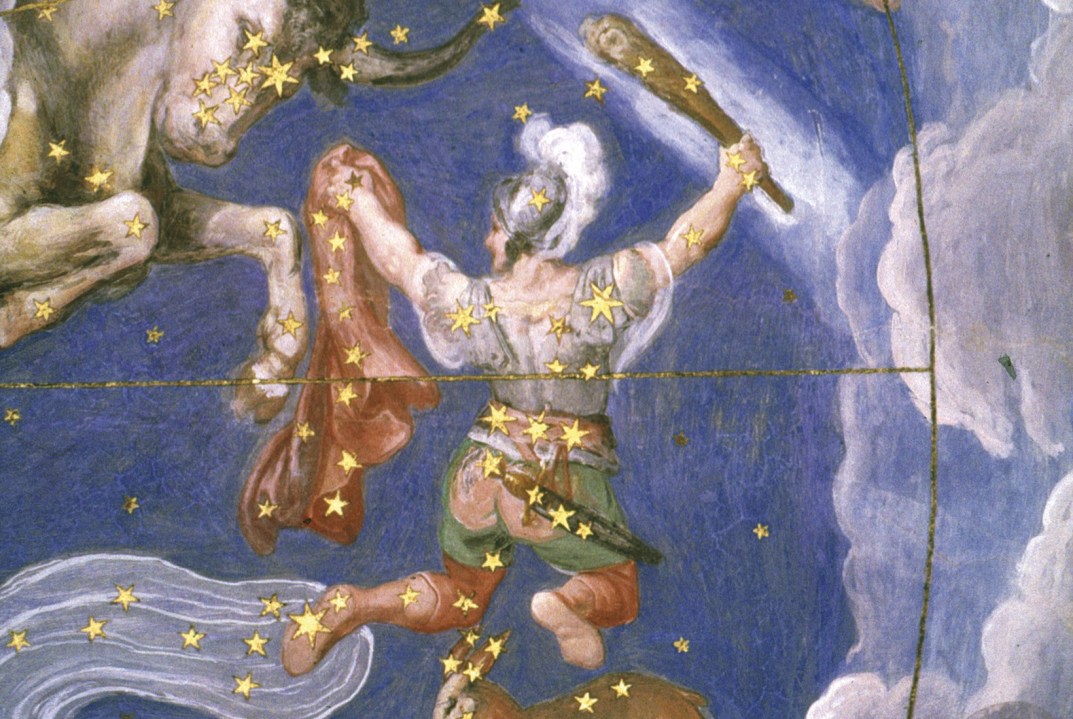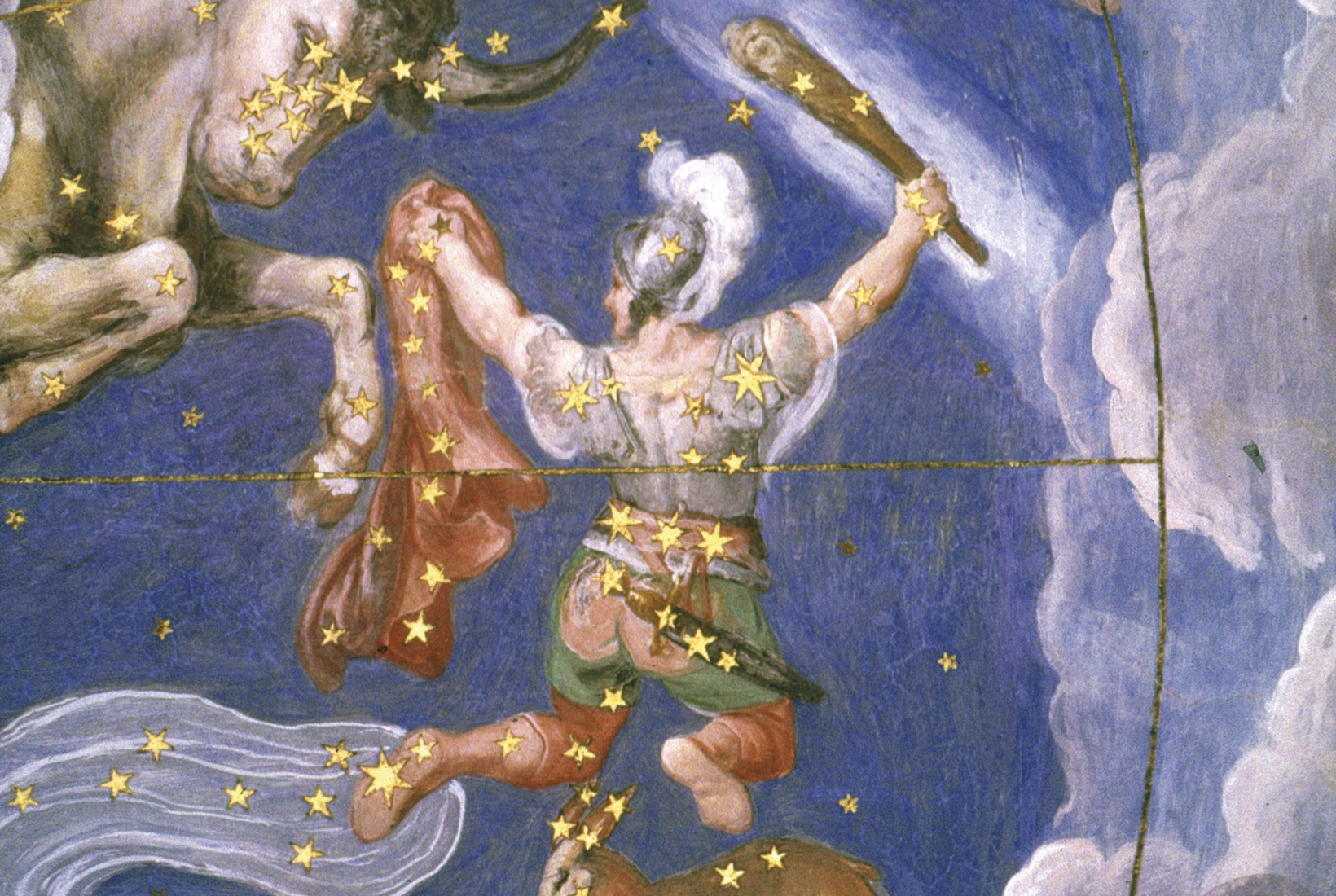What happened in the rites of Eleusis is a mystery. So are all the unwritten parts of human history. Our pre-literate past is a history without a clear story: excavated stones and waste pits, fragments of myth and philological association. The early literate past is little clearer. The later Bronze Age of the Myceneans, the Minoans and Moses is a speculative assembly. Later, the surfaces of the Athens of Plato and Pericles are solid in marble and rational in thought, but the myths remain strange and violent memories, subject to an alien, evasive logic we cannot quite follow. ‘These Greeks,’ Hugo von Hofmannsthal mused as he climbed up to the Acropolis in 1908, ‘where are they?’
The Celestial Hunter is the latest instalment in Roberto Calasso’s exploration of what makes us modern, which is also the rediscovery of what made us ancient. This time, Calasso narrates the religious prehistory of ancient Greece, from shamanic origins to the ages of gods and heroes, and then to Athens’s uneasy incorporation of the Eleusisian mystery cult. The effect is akin to that experienced by Hofmannsthal when, entering the Acropolis museum, he encountered five korai, robed female statues, standing in a semi-circle: ‘An unnamed fear… a light much stronger than real light’, a sense of ‘something liquid’ in the stone, ‘as if the eyes of the statues had suddenly turned towards me, and in those faces was a wholly inscrutable smile’.
The meaning of that ‘Archaic smile’ remains obscure, and so do the reasons for its fall from artistic or theological taste in the fifth century BC. Behind the statues lies the hinterland of origins: the ‘traumatic and irreversible’ metamorphosis of our species from scavenger to predator through imitating animals such as the hyena; the emergence of hunting as the ‘central’ activity and the hunter as ‘first self-sufficient being’; the ritualisation of killing and being killed; and then the consolidation of shamanic religion and the metaphysics of hunting in the image of Orion the hunter.
Orion, the killer of all animals, became celestial because Apollo tricked his sister Artemis into shooting him with an arrow. Artemis ended his metamorphoses by fixing him in the heavens as a constellation. Human life, Calasso writes, ‘is constellated with stories suspended, attached to the vault of the sky’, and the metamorphosis of the literal to the symbolic. The ‘image of God dressed as an animal’, Simone Weil suggested, derived from Homo sapiens’s first encounter with Neanderthal man. Adam and Eve emerge from the Garden wearing animal skins, and animals begin to appear as cult objects on military standards in Egypt. Cephalus the hunter kills his wife Procris in the form of an animal, and Jason pursues a sacred fleece. A temple is built to Artemis at Ephesus, where a wild boar falls to a spear; inside the temple, the effigy of the Mistress of the Animals, the early European totem, is swathed in ‘a heavy layer of clothing’.
The heroic age ends in the half century between the Argonauts and the return of Odysseus from the Trojan War, in ‘the rough and tattered remains of a wondrous animal, displayed as a hunting trophy or an ex voto in the temple’. The divine matter survives, is fixed as ‘material to sing, to narrate, to elaborate’ — and then to read, as literature. Plato reckoned that education, public worship and the oracles of Delphi allowed the Greeks, though a relatively young people, to ‘take care’ of the ancient and barbarian gods of Egypt and Sumeria, but ‘in a more noble and just way’. The leopard riders depicted at Göbekli Tepe appear to anticipate the Dionysus cult, the catharsis of the theatre is preceded by shedding the blood of ‘purifiers’, young pigs, in the agora. Yet the foundations of the polis inter divine vitality along with blood-guilt. The liquid past slowly petrifies into stone.
Calasso argues that the Laws are Plato’s ‘final plea’ for the powers of metamorphosis. ‘I have said what I have said because I saw and heard the god,’ says Plato’s Athenian: society should make divinity visible and audible. Instead, Aristotle triumphs: in his Politics, religion serves society. The necessity of imitation became the mimesis of aesthetics, hunting an aristocratic exercise and oral law the written law. The Demeter cult at Eleusis, subordinated to Athens but beyond its bounds, was a late survival that preserved ‘the secret of things that are there before everyone’s eyes’ with poppy juice and visionary rites.
Calasso is allusive and dazzlingly eclectic. Like Marsilio Ficino’s attempt to revive Plato’s academy at Florence, The Celestial Hunter is ‘an initiation through the book’, speculative but capable of changing how you see things. One of the curious survivals that are ‘before everyone’s eyes’ is that if you take the road that used to be the Sacred Way from Athens to Eleusis, just past the stock exchange you will see, partially hidden in a wood, a hunting lodge built by Otto, the first king of modern Greece.








Comments